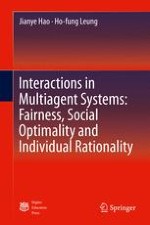2016 | OriginalPaper | Chapter
4. Social Optimality in Cooperative Multiagent Systems
Authors : Jianye Hao, Ho-fung Leung
Published in: Interactions in Multiagent Systems: Fairness, Social Optimality and Individual Rationality
Publisher: Springer Berlin Heidelberg
Activate our intelligent search to find suitable subject content or patents.
Select sections of text to find matching patents with Artificial Intelligence. powered by
Select sections of text to find additional relevant content using AI-assisted search. powered by
